Eric E. Wright's Blog, page 37
June 10, 2014
The Mysterious Power of Growing Things
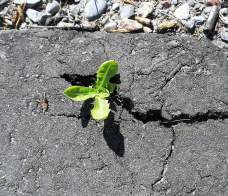 Out for a walk recently, I noticed something startling. The path on which we trod had been recently paved. And there sticking up through the pavement were little plants; plants determined to force their way into the sunlight.
Out for a walk recently, I noticed something startling. The path on which we trod had been recently paved. And there sticking up through the pavement were little plants; plants determined to force their way into the sunlight.
One wonders how soft plant material can possibly thrust itself through tough asphalt, but it does. The innate power of growing things is visible throughout our world. Trees growing out of temples in Cambodia. Oat grass reclaiming dunes in the Carolinas. Tree roots lifting concrete paving slabs in our cities. Living things in the natural world exhibit an incredible vigor.
Much more potent is the spiritual power of God as manifest in the transformation of sinners into followers of Jesus Christ. When I was converted by God as a 19 year old, my life began to change overnight. Swear words dropped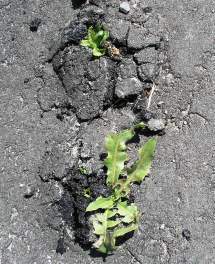 from my vocabulary. A concern for others began to slowly break up the hardness of my pervasive selfishness. Hope and faith began to chase away the clouds of gloom and discouragement that periodically engulfed me. As Jesus taught me his standards of right and wrong, I felt a compulsion to confess my stealing to a store manager where I’d pilfered some items. To this day, God continues to woo me to embrace change. Sometimes he has to shake me out of complacency.
from my vocabulary. A concern for others began to slowly break up the hardness of my pervasive selfishness. Hope and faith began to chase away the clouds of gloom and discouragement that periodically engulfed me. As Jesus taught me his standards of right and wrong, I felt a compulsion to confess my stealing to a store manager where I’d pilfered some items. To this day, God continues to woo me to embrace change. Sometimes he has to shake me out of complacency.
The life-principle imparted by God transforms. “Therefore if anyone is in Christ, he is a new creation; the old has gone, the new has come”(2 Cor. 5:17)! That life comes through Christ. “In him was life, and that life was the light of men”(John 1:34). Christ explains; “I am the way, the truth and the life”(John 14:6). The new life he imparts to a repentant sinner is potent with potential! “I have come that they may have life, and have it to the full [abundantly]“(John 10:10). Nothing can resist the implanted power of new life in Christ. Drug addiction? No. Lust? No. The desire to control others, to abuse them, to steal from them? No. Fear of death? No.
 Throughout history and all over the world today the power of new life in Christ continues to transform people. Licentious Augustine became a godly bishop and gifted theologian. God moved C.S. Lewis from agnosticism to faith. And in our day, Muslim jihadis become loving disciples. Drug addicts break free from their habit. Hypocrites become sensitive and humble. Tribal men and women in Ethiopia joyfully cast off their fear of death and witch doctors. A cutthroat money trader becomes honest and generous in giving. A single mother bound in poverty and despair rises up with new faith in God’s ability to provide.
Throughout history and all over the world today the power of new life in Christ continues to transform people. Licentious Augustine became a godly bishop and gifted theologian. God moved C.S. Lewis from agnosticism to faith. And in our day, Muslim jihadis become loving disciples. Drug addicts break free from their habit. Hypocrites become sensitive and humble. Tribal men and women in Ethiopia joyfully cast off their fear of death and witch doctors. A cutthroat money trader becomes honest and generous in giving. A single mother bound in poverty and despair rises up with new faith in God’s ability to provide.
Living things reflect the Creator’s power to initiate change in humans. The change begins when we embrace the gospel and ends when we pass into heaven. Meanwhile, are you and I resisting or rejoicing in the flow of life eternal in us and through us? Are we open to positive change or resistant to the alteration of our lives, as the Spirit works to conform us to the image of Jesus Christ?
[For descriptions of books such as Through A Country Window, and Eric's newest suspense novel,Riptide, please see http://www.countrywindow.ca


May 29, 2014
Spring Reminds Me to Celebrate Youth
In the spring we gaze in awe at the flush of new growth we see all around us. The reviving trees paint the whole countryside with a coat of vibrant, light green.  How to describe this astounding colour? Is it lime green? Not quite. Emerald green; closer but not as dark. Sea green may be closer still. Perhaps bottle green? Whatever the technical term might be, we love how the Creator decorates the hillsides with a thousand subtle shades of spring green. So fresh. So alive.
How to describe this astounding colour? Is it lime green? Not quite. Emerald green; closer but not as dark. Sea green may be closer still. Perhaps bottle green? Whatever the technical term might be, we love how the Creator decorates the hillsides with a thousand subtle shades of spring green. So fresh. So alive.
It reminds us of the vibrancy of young life. The wonder we feel at the birth of a new baby. The energy and excitement of a child. The awesome potential of a young person with his or her whole life ahead. It’s wonderful to celebrate along with youth the hope and dreams they feel.
Many of us older folks remain vibrant and hopeful but sometimes our aches and pains and sorrows make us somewhat jaded and world-weary. Admittedly, there are children who are obnoxious and young people who have a dark and hopeless view of life. But  too often we find unnecessary fault with the antics of a child, the perceived carelessness of a teenager, or the brash self-confidence of a twenty-something. Could our irritation be rooted in envy? Or perhaps nostalgia?
too often we find unnecessary fault with the antics of a child, the perceived carelessness of a teenager, or the brash self-confidence of a twenty-something. Could our irritation be rooted in envy? Or perhaps nostalgia?
Older and younger, we need each other to achieve balance in life. Sadly, the modern breakup of families has left many of us without any positive experience of the warmth of an extended family; children, parents, grandparents, uncles, cousins. We segregate everyone into age brackets: Gen X, Baby Boomers, Millennials, and so on. It may help marketers but it’s not healthy.
Every year has a spring, summer, fall and winter and every human needs connection with people of every age and experience. Pers onally, I don’t find living in a senior’s ghetto attractive at all. (To some it may be just what they need.) But most of us seniors need to rub shoulders with children and young people—and they need us older folks. Perhaps some of their joie de vivre will rub off on us and some of our wisdom on them. Perhaps we’ll become more tolerant, better adjusted, less jaded and gloomy. Didn’t Jesus rebuke the disciples for hindering children from coming to him?
onally, I don’t find living in a senior’s ghetto attractive at all. (To some it may be just what they need.) But most of us seniors need to rub shoulders with children and young people—and they need us older folks. Perhaps some of their joie de vivre will rub off on us and some of our wisdom on them. Perhaps we’ll become more tolerant, better adjusted, less jaded and gloomy. Didn’t Jesus rebuke the disciples for hindering children from coming to him?


May 22, 2014
Sometimes Life Is Like A Swamp
Sometimes life is like a swamp: boggy, muddy, wet, full of biting insects. Can any good come out of these times of distress?
 Swamps may appear pretty in the spring when clothed in marsh marigolds. But many consider swamps as useless land, good for nothing. And so, for centuries we have been draining swamps and bogs to create more tillable land or to enable buildings to be erected. Millions and millions of acres have been reclaimed to gratify our human view of progress. For example, the Florida Everglades have been reduced from eight million acres to just two million.
Swamps may appear pretty in the spring when clothed in marsh marigolds. But many consider swamps as useless land, good for nothing. And so, for centuries we have been draining swamps and bogs to create more tillable land or to enable buildings to be erected. Millions and millions of acres have been reclaimed to gratify our human view of progress. For example, the Florida Everglades have been reduced from eight million acres to just two million.
Like much else in our created world we have failed to understand the importance of conservation. In this case, in losing wetlands, we lose their incredible capacity to act as sponges filtering out harmful pollutants. We also lose their effect in absorbing flood waters. And so we harm ourselves.
We also disrupt the balance of creation by destroying the habitat for algae, zooplankton and all the higher creatures that feed on them. Wetlands create  an ideal environment for a host of creatures from snails to salamanders, frogs and lizards. Swamps create an ideal home for many birds and mammals: herons, ospreys, rabbits, otters, bobcats, deer, beavers, raccoons, and black bears.
an ideal environment for a host of creatures from snails to salamanders, frogs and lizards. Swamps create an ideal home for many birds and mammals: herons, ospreys, rabbits, otters, bobcats, deer, beavers, raccoons, and black bears.
Admittedly, swamps also harbor insects such as mosquitoes…but these feed a wealth of birds as well as annoy us.
Swamps can be viewed as a metaphor for difficult times in our lives. We’re journeying through sunlit fields of ripening grain, singing as we hike along shady forest paths and then suddenly we plunge  into a swamp. The ooze sucks at our shoes. Mosquitoes feast on our face and necks. A snake slithers across our boggy path.
into a swamp. The ooze sucks at our shoes. Mosquitoes feast on our face and necks. A snake slithers across our boggy path.
Life has been good. We’re healthy and strong. Our children act like cherubs. Our pay cheque swells. We holiday in Rome and Venice. Friends multiply. Then suddenly the climate changes.
A child falls sick with a life-threatening illness. We are demoted at work. The catalytic converter on our car needs to be replaced. The washing machine packs it in. We develop headaches. Sleep eludes us at night. The doctor is mystified. The chiropractor can’t help.
Why Lord? Why so much all at once? What have we done to merit a swampy experience? The whys reverberate in our minds. The heavens are as brass. Silence from above. We suffer anguish without understanding purpose or cause.
We may need to remind ourselves that, like swamps, there may be a myriad of good effects hidden from our superficial sight.
Painful swamp experiences bring to the surface the pollutants that lurk unacknowledged in our characters: impatience, arrogance, doubt, laziness, aimlessness, tenuous grasp of God’s purposes, and self-confidence in place of trust in the Master. Trials and suffering give us a chance to acknowledge our terrible flaws and sins and bring them to the only one who can forgive and heal us.
Swamp experiences teach us to empathize with others in similar circumstances. God is the one “who comforts us in all our troubles, so that we can comfort those in any trouble with the comfort we ourselves have received from God”(2 Cor. 1:4).
 Swamp experiences, if we bow to Christ in submission, give the Holy Spirit opportunity to reform our character into the image of Christ. Out of bad, even evil, He makes a host of good to arise. “We rejoice in our sufferings because we know that suffering produces perseverance, perseverance, character; and character, hope. And hope does not disappoint us, because God has poured out his love into our hearts by the Holy Spirit, whom he has given us”(Romans 5:3-5).
Swamp experiences, if we bow to Christ in submission, give the Holy Spirit opportunity to reform our character into the image of Christ. Out of bad, even evil, He makes a host of good to arise. “We rejoice in our sufferings because we know that suffering produces perseverance, perseverance, character; and character, hope. And hope does not disappoint us, because God has poured out his love into our hearts by the Holy Spirit, whom he has given us”(Romans 5:3-5).
But Lord, we are frail. Help us to remember you are always with us and help us to be a blessing to others for your glory.


May 13, 2014
Being A Refresher
For some time now I’ve been wondering what Onesiphorus did that refreshed  Paul. Writing from prison, Paul asked the Lord to “show mercy to the household of Onesiphorus, because he often refreshed me and was not ashamed of my chains….He searched hard for me until he found me…You know very well in how many ways he helped me in Ephesus”(2 Tim. 1:16-18).
Paul. Writing from prison, Paul asked the Lord to “show mercy to the household of Onesiphorus, because he often refreshed me and was not ashamed of my chains….He searched hard for me until he found me…You know very well in how many ways he helped me in Ephesus”(2 Tim. 1:16-18).
Whatever Onesiphorus did, it had to be important or else Paul wouldn’t have mentioned it. Refresh means to invigorate, re-energize or revive. Maybe he took Paul a good meal, or clean clothes, or ointment for the sores caused by the chains he had to wear.
I don’t really know whether he did any of these things but I do know that he  made up his mind to do something for Paul. He sought him out; he wasn’t embarrassed to visit him in prison and while there he brought blessing into Paul’s life.
made up his mind to do something for Paul. He sought him out; he wasn’t embarrassed to visit him in prison and while there he brought blessing into Paul’s life.
I’m thinking that he must have revived his spirit perhaps by bringing news of the spiritual fruit evident in the Philippian Church. Perhaps he shared some comforting spiritual truths. Possibly, he had listened to Paul’s teaching then spent time praying with him. Being present obviously meant much to the apostle. Somehow Onesiphorus let Paul know he cared. Since the word often is used, he must have frequently contributed to reinvigorating Paul’s spirit.
 Other people have often refreshed me. One friend used to arrive at our door from time to time with a single red rose. Another friend used the phone to express her concern about how I was doing. Still another used to interrupt our phone conversations by saying, Let’s just take this to the Lord in prayer. Refreshers—how wonderful they are!
Other people have often refreshed me. One friend used to arrive at our door from time to time with a single red rose. Another friend used the phone to express her concern about how I was doing. Still another used to interrupt our phone conversations by saying, Let’s just take this to the Lord in prayer. Refreshers—how wonderful they are!
It’s good to be on the receiving end. But I ask myself, Am I a refresher, an Onesiphorus, or do I depress others? And so I pray, Father, even from my rocking chair I want to be used to refresh your children. (From Mary Helen’s rocking chair.)


May 6, 2014
Such A Long Wait!

Crocuses
Throughout this long, long winter we’ve been waiting impatiently for the first sight of green, the first peek of a crocus.
Waiting, like temptation, is common to all of us. Waiting to catch a bus. Waiting for traffic congestion to ease. Waiting in a doctor’s office. Waiting in line at the post office or the check-out line in the grocery store. Waiting for a diagnosis. Waiting for a sick friend to smile again. Waiting for a grandchild to find a godly life-partner. And yes, waiting for God to answer a decade’s old prayer for the conversion of a friend or relative.
 We know that our heavenly Father wants us to learn patience while maintaining hope for the future—especially as it relates to the return of Christ. “Be patient, then, brothers, until the Lord’s coming. See how the farmer waits for the land to yield its valuable crop and how patient he is for the autumn and spring rains”(James 5:7). But we ask the Lord, do we need so much practice? Our natures cry out, we can’t wait—whatever it is we think we need, we want now—whether it be justice for the oppressed or relief from our own sufferings.
We know that our heavenly Father wants us to learn patience while maintaining hope for the future—especially as it relates to the return of Christ. “Be patient, then, brothers, until the Lord’s coming. See how the farmer waits for the land to yield its valuable crop and how patient he is for the autumn and spring rains”(James 5:7). But we ask the Lord, do we need so much practice? Our natures cry out, we can’t wait—whatever it is we think we need, we want now—whether it be justice for the oppressed or relief from our own sufferings.
And Lord, two thousand years have gone by since the promise of Christ’s return. Just as we wondered this year why spring was delayed we wonder why the Lord’s return is so delayed. For as we gaze out on a hurting world through the medium of television, it seems apparent that Jesus should return so that justice and peace might roll down like a river. Suffering in Syria. Kidnapped school girls in Nigeria. Human trafficking. Sabre-rattling from Russia. Suicide amon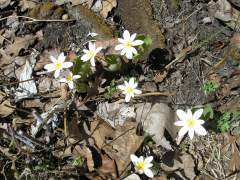 g our teens. We cry out in agony, how long Lord?
g our teens. We cry out in agony, how long Lord?
Although we have not doubts about Christ’s return, we are perplexed and impatient. And so we do what we always do when perplexed, we return to the Word and read again the promises. “For the Lord himself will come down from heaven, with a loud command, with the voice of the archangel and with the trumpet of God”(1 Thess4:16).
The Scriptures remind us that all God’s promises are fulfilled, though often delayed. The judgment on Israel, the destruction of first, Samaria then Jerusalem was delayed for centuries as the prophets sought to arouse the people to repentance. Perhaps we forget that it is God’s comp assion and mercy that delays judgment. “Do you show contempt for the riches of his kindness, tolerance and patience, not realizing that God’s kindness leads you towards repentance?”(Rom. 2:4). His delayed judgment on our age is really an expression of his mercy giving time for every tribe and tongue and nation to respond to the invitation of the gospel.
assion and mercy that delays judgment. “Do you show contempt for the riches of his kindness, tolerance and patience, not realizing that God’s kindness leads you towards repentance?”(Rom. 2:4). His delayed judgment on our age is really an expression of his mercy giving time for every tribe and tongue and nation to respond to the invitation of the gospel.
A delayed spring gives us practice in waiting for many things, but especially the return of Christ. After all, Paul did say, “The creation itself will be liberated from its bondage to decay and brought into the glorious freedom of the children of God” when Christ returns in glory and power. “We know that the whole creation has been groaning as in the pains of childbirth right up to the present time…we ourselves…groan inwardly was we wait eagerly” for the consummation of all things.
And so as we see leaves finally unfurling and flowers finally lifting their faces to the sun, we are reminded that even a long wait is worth it. Our wait for the new heaven and new earth will be worth it.


April 25, 2014
One’s Personal Fog Index
When we plunge into a dense fog, only what is immediately around us remains visible. Objects at some distance, depending on the density of the fog, disappear. In the same way, personal events tend to distract us from noticing what is going on beyond our own person or family. It is a very unusual person who remains concerned about refugees in Lebanon when they’ve just lost their job or received a diagnosis of cancer.
Since my knee surgery a month ago, I’ve been dealing with discomfort, sleepless  nights and exercise that leaves me sore. This experience almost completely obscured my perspective on world events and the needs of others. The disappearance of the Malaysian Airlines plane hardly left a blip on my consciousness. The greater the intensity of one’s own immediate experience, the less aware we become of events in the world at large—even the concerns of friends.
nights and exercise that leaves me sore. This experience almost completely obscured my perspective on world events and the needs of others. The disappearance of the Malaysian Airlines plane hardly left a blip on my consciousness. The greater the intensity of one’s own immediate experience, the less aware we become of events in the world at large—even the concerns of friends.
My surgery is classed as routine. It is not to be compared with other, more serious procedures. Nor would I in any way compare my discomfort with those who suffer unremitting pain or the long-term and terrible effects of cancer. In no way can my experience be compared with those recovering from any natural disaster. Many, many people are worse off than me. But that is hard to remember when I’m trying to make my knee bend or sleep through the night. One’s own experience tends to throw a dense fog over what is external to one’s life, blotting out perspectives on others and their suffering.
This all sounds selfish and callous and yet it is natural to be fogged in when personal stress is highest. Our awareness and concern for others tends to shrink as we become absorbed in our own pain regimen.
What is true of the effect of pain and suffering is especially true of selfishness. We are all concerned about our own welfare, our needs, our goals, our hopes. And the more self-absorbed we are the less we perceive the concerns of other. Selfishness envelops us in a fog of our own making. Selfishness is terribly blinding and short-sighted.
 Somehow we need to find a way to dissipate the fog that hides from our eyes the needs of others. We need to develop some way of maintaining an unselfish perspective that helps us rise above our immediate circumstances.
Somehow we need to find a way to dissipate the fog that hides from our eyes the needs of others. We need to develop some way of maintaining an unselfish perspective that helps us rise above our immediate circumstances.
As Christians, we realize that only Christ, through the indwelling Holy Spirit, can overcome our natural self-absorption. “Each of you should look not only to your own interests, but also to the interests of others”(Phil 2:4). We need to ask God to help us lift up eyes of compassion to see those who suffer beyond us, even in Syria, in Iran, or in North Korea. Empathy does not come naturally. We must learn it. Our default position should be concern for others driven by empathy and compassion.
While being fogged in by our own concerns or trials may be natural, it should not be the reaction of a follower of Christ. What is your fog index? What is mine?


April 13, 2014
Surprised by Love
 During the last few months I’ve been mysteriously blessed at unpredictable times. Suddenly, I would find myself overwhelmed by a sense of God’s love. These occurrences could not be traced to anything I had done devotionally. They were not because I had been more faithful than usual in prayer or studying the Word. Quite the contrary. Without warning, I would feel tears rise behind my eyes at the thought of God’s tender love.
During the last few months I’ve been mysteriously blessed at unpredictable times. Suddenly, I would find myself overwhelmed by a sense of God’s love. These occurrences could not be traced to anything I had done devotionally. They were not because I had been more faithful than usual in prayer or studying the Word. Quite the contrary. Without warning, I would feel tears rise behind my eyes at the thought of God’s tender love.
Could it be due to physical vulnerability? This has certainly been a stressful time of stumbling around with a cane and then undergoing radical knee replacement surgery. In the aftermath of the surgery I’ve had to deal with pain and dark nights of sleeplessness. This whole experience has curtailed my rather organized devotions: reading an Old Testament passage and a New Testament passage then going through a prayer list.
I’ve begun to wonder if my devotional life has been too regimented, not spontaneous enough. I think that is part of it. God just wants to show me he loves me whether or not I’m able to complete my quiet time. Even when my  discipline crumbles leaving mere fragments of good intentions, he wants to assure me of his love.
discipline crumbles leaving mere fragments of good intentions, he wants to assure me of his love.
This feeling could sweep over me due to the stanza of a hymn. Love divine, all love excelling. Joy of heaven brought down to earth. Or Meekness and majesty…this is your God…bow down in worship.
It could be sparked by rays of sunshine pouring in the window after days of gloom. God, the creator, loves to pour sunshine into our souls as w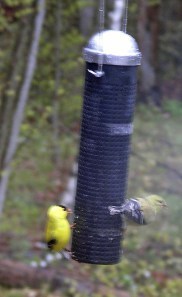 ell as through our windows. He is a good and giving God.
ell as through our windows. He is a good and giving God.
It could be a bird on the feeder. The dazzling yellow plumage of a goldfinch set against the rather depressing brown of early spring in all the surrounding trees and flower beds.
It could be a touch from Mary Helen. Who am I to have been led to such a faithful helpmate!
Whatever the cause, I’m grateful to God for reminding me that he loves me not for anything in me or anything I’ve done. So often we feel that we must earn God’s affection. In reality, “Neither height nor depth, nor anything else in all creation, will be able to separate us from the love God that is in Christ Jesus our Lord”(Rom. 8:35,39). (Read this whole wonderful chapter in Romans.)
As a mother or father loves their child, so our Father loves us, not because of anything in us, but because through his redeeming work we have become his children. I’m sure I need to be reminded much more often that God’s love is tender, faithful, constant. And I’m sure that my expressions of love for him need to be more spontaneous. Such whispers from God are not frequent nor can they be programmed. But they are wonderful gifts of the Father, Son and Holy Spirit.


March 13, 2014
Grandma’s mysterious purse
“Do you have any gum, Grandma?” asked one of our granddaughters a few years ago.
 Mary Helen searched in her voluminous purse and shortly came up with gum which she shared. I join our grandchildren in expecting her purse to have anything I need at the time. Finger nail file? Check. Change for a coffee? Check. Kleenex for my runny nose. Check. Lipstick, credit cards, sunglasses, reading glasses, pads of paper, 26 ballpoint pens of dubious origins, her little address book…the list is endless. There’s a brush, a pair of tiny scissors, her wallet, an extra plastic bag, some candy and a pill box.
Mary Helen searched in her voluminous purse and shortly came up with gum which she shared. I join our grandchildren in expecting her purse to have anything I need at the time. Finger nail file? Check. Change for a coffee? Check. Kleenex for my runny nose. Check. Lipstick, credit cards, sunglasses, reading glasses, pads of paper, 26 ballpoint pens of dubious origins, her little address book…the list is endless. There’s a brush, a pair of tiny scissors, her wallet, an extra plastic bag, some candy and a pill box.
If I have a cut, I can always ask, “Do you have a plastic bandage in there?” The answer will always be, “Of course!”
Lozenge to help endure a rather dull sermon? Oh, yeah it’s down there somewhere. It may take her a while to find it though. Before she finds it, my eyes may glaze over, especially if it’s a 3 lozenge message that goes on for forty minutes.
Her purse has three main compartments and a million little crannies. How one could find anything there is beyond me. Young women must go to some mysterious weekend seminar on how to buy and organize purses. Sadly, the buying they never forget, but the organization is quickly lost to mind. Not that I’m being judgmental it’s just that when I ask for something it takes her lots of time to find it. And, of course, I like to deflect attention from my own foibles. You see my desk drawers are chaotic and the garage is…well, let’s not go there.
time to find it. And, of course, I like to deflect attention from my own foibles. You see my desk drawers are chaotic and the garage is…well, let’s not go there.
I may have been a boy scout and learned to always be prepared, but it’s Mary Helen who is really prepared—for everything, except nuclear war. After all she has a purse. All we men have, unless we’re European, is a wallet and some pockets.
Every man should have a wife or friend who has a purse. How can we possibly get through life without an inexhaustible source of whatever we need at the moment. And we can be confident that if she is mugged, she can always clock the perpetrator with her purse.
Let’s hear it for purses. Hip, hip, hurrah.
(PS. Eric’s new suspense novel, Riptide, is now available from major outlets and from http://www.countrywindow.ca)


February 28, 2014
Tracks In The Snow
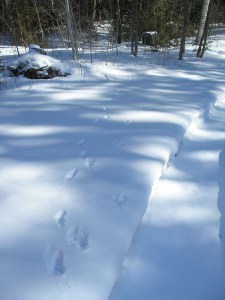 Each new snow, of which we’ve had plenty this winter, leaves a fresh page upon which animals leave their prints. In the morning I can usually distinguish from the window the marks left by juncos, rabbits, squirrels, and our neighbour’s dog.
Each new snow, of which we’ve had plenty this winter, leaves a fresh page upon which animals leave their prints. In the morning I can usually distinguish from the window the marks left by juncos, rabbits, squirrels, and our neighbour’s dog.
Along the road there may be the signs of passing turkeys or deer. Those familiar with the lore of the woods can identify each animal and bird by the tracks they leave.
Our lives also leave the impression of our passing on the lives we touch. Paul wrote to Timothy urging him to “set an example for the believers in speech, in life, in love, in faith and in purity” (1 Tim. 4:12b). The great apostle’s life was so transparently holy that he and asked the brothers and sisters to “follow our example”(2 Thess 3:7) since “we make ourselves a model for you to follow”(2 Thess. 3:9).
Of course, perfection cannot be found in any human hero. Paul admitted, “I know that nothing good lives in me, that is, in my sinful nature” (Rom. 7:18). We  would be wise then to heed Peter who reminds us that only Christ Jesus left us the perfect example, “that you should follow in his steps” (1 Peter 2:21).
would be wise then to heed Peter who reminds us that only Christ Jesus left us the perfect example, “that you should follow in his steps” (1 Peter 2:21).
One of the great values of Scripture is the inspired portrait it paints of patriarchs and prophets, kings and shepherds who left their marks on redemptive history. In some cases the story gleams with light; in others the malevolent glow of brimstone warns us away from the pathway to destruction. There we discover Adam and Cain, Abraham and Jacob, Rachel and Ruth, Hezekiah and Manasseh, Saul and David, Judas and Paul.
Even depraved lives are recorded, “as examples to keep us from setting our hearts on evil things as they did”(1 Cor. 10:6). Esau sold his birthright for a quick meal. Like unhappy taxpayers, the Israelites grumbled throughout the exodus. Like corrupt executives salting away millions, King Solomon hoarded gold and horses and wives.
 The tracks left by godly men and women, however, are what inspire us to climb the upward path. “By faith Abel offered God a better sacrifice than Cain did. . . By faith Noah, when warned about things not yet seen, in holy fear built an ark to save his family. By faith Abraham . . .made his home in the promised land . . . offered Isaac as a sacrifice”(Heb. 11:4,7, 8,9,17).
The tracks left by godly men and women, however, are what inspire us to climb the upward path. “By faith Abel offered God a better sacrifice than Cain did. . . By faith Noah, when warned about things not yet seen, in holy fear built an ark to save his family. By faith Abraham . . .made his home in the promised land . . . offered Isaac as a sacrifice”(Heb. 11:4,7, 8,9,17).
Besides biblical biographies, God often uses more contemporary stories of godly men and women to challenge us to walk more carefully in the footsteps of Jesus. The gospel energy of John Wesley and the astounding mind of C.S. Lewis have inspired me to greater heights as have the stories of transformed tribals in Ethiopia’s Oro Valley.
Not only spiritual giants leave a mark. All of us can point to the tracks left by seemingly ordinary Christians who blessed our lives. I remember Florence Scruton’s example of cheerful thankfulness in spite of declining health, Elaine Mutter’s generosity during our mission years and the enthusiasm for the gospel exhibited by Pakistani pastor, Hidayat.
exhibited by Pakistani pastor, Hidayat.
Sadly, I can think of others who have left behind an example of schism, controversy or moral bankruptcy. So I need to ask myself, what tracks do I leave? How deep is my devotion to Christ?


February 17, 2014
The Winter Of Our Discontent
 This winter is one for the record books. Repeated snowstorms have pounded much of the US and Canada. Here in Ontario, it’s been decades since we had so much snow on the ground for so long. Early on we had a paralyzing ice storm that knocked out power even in Toronto.
This winter is one for the record books. Repeated snowstorms have pounded much of the US and Canada. Here in Ontario, it’s been decades since we had so much snow on the ground for so long. Early on we had a paralyzing ice storm that knocked out power even in Toronto.
Images of stranded motorists, multi-vehicle pileups, downed power lines, and snow-chocked streets have filled our TV screens. And when forecasters weren’t warning about the latest winter storm they were lamenting the drought and fire danger in California.
How do we react to harsh weather? Well, if you are like most of us, you complain  about it. “What terrible weather.” “It’s so cold.” “I can’t wait for spring to come.” “Why don’t we get more sunshine?” This winter scores in the 99 percentile on the “complaint scale”.
about it. “What terrible weather.” “It’s so cold.” “I can’t wait for spring to come.” “Why don’t we get more sunshine?” This winter scores in the 99 percentile on the “complaint scale”.
But why complain? We can’t change it. Are we letting off steam? Has winter’s icy grip plunged us into very real depression? Or, are we just having fun? Perhaps we’re using comments about the weather to initiate conversations with strangers? Weather is a safe subject that keeps us from making verbal faux pas about politics or religion or women’s apparel.
On a deeper level, however, we need to consider the whole issue of contentment in general. Is our happiness dependent on circumstances such as our health, our bank account, or our status? It takes real maturity to maintain equanimity in less than ideal situations. But that’s exactly what God calls Christians to develop. 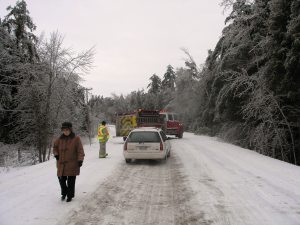 Paul was able to say, “I have learned to be content whatever the circumstances”(Phil. 4:11) and this in spite of suffering terrible storms, torture, shipwreck and privation of many kinds. See 2 Corinthians 11:23-29. Contentment didn’t come naturally to Paul. He probably often complained about his circumstances before he learned to be content. His example gives us hope; we’re all on a steep learning curve.
Paul was able to say, “I have learned to be content whatever the circumstances”(Phil. 4:11) and this in spite of suffering terrible storms, torture, shipwreck and privation of many kinds. See 2 Corinthians 11:23-29. Contentment didn’t come naturally to Paul. He probably often complained about his circumstances before he learned to be content. His example gives us hope; we’re all on a steep learning curve.
We need to ask God to help us to learn contentment, not only with the weather but with our financial and physical health. In adopting us into his family, our Father obviously cares for us and will provide for us. “Be content with what you have, because God has said, ‘Never will I leave you; never will I forsake you.’”(Heb. 13:5). (Remember that this does not mean we are to be content to bury our gifts and abilities like the wicked servant in the parable of the talents.)
In general, the picture we glean of Israel in the Old Testament is of a complaining nation. Moses warned them, “You are not grumbling against us, but 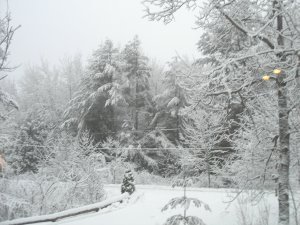 against the Lord”(Ex. 16:8d). Israel’s story warns us that serious complaints uncover dissatisfaction with God’s providential care.
against the Lord”(Ex. 16:8d). Israel’s story warns us that serious complaints uncover dissatisfaction with God’s providential care.
In our day, when there is such an emphasis on wealth and status we need to read often what Scripture teaches about discontent. Jesus asks us not to worry about what to eat, drink or wear, but instead to “seek first his kingdom and his righteousness, and all these things will be given you as well”(Matt. 6:33). Paul writes; “Godliness with contentment is great gain”(1 Tim. 6:6).
Charles Spurgeon said it well. “Now, contentment is one of the flowers of heaven, and if we would have it, it must be cultivated; it will not grow in us by nature; it is the new nature alone that can produce it, and even then we must be specially careful and watchful that we maintain and cultivate the grace which God has sown in us.… Do not indulge the notion that you can be contented without learning, or learn without discipline. It is not a power that may be exercised naturally, but a science to be acquired gradually. We know this from experience. Brother, hush that murmur, natural though it be, and continue a diligent pupil in the College of Content.”
Do not indulge the notion that you can be contented without learning, or learn without discipline. It is not a power that may be exercised naturally, but a science to be acquired gradually. We know this from experience. Brother, hush that murmur, natural though it be, and continue a diligent pupil in the College of Content.”
And so Lord, help us to learn to be content. We’re not there yet.





